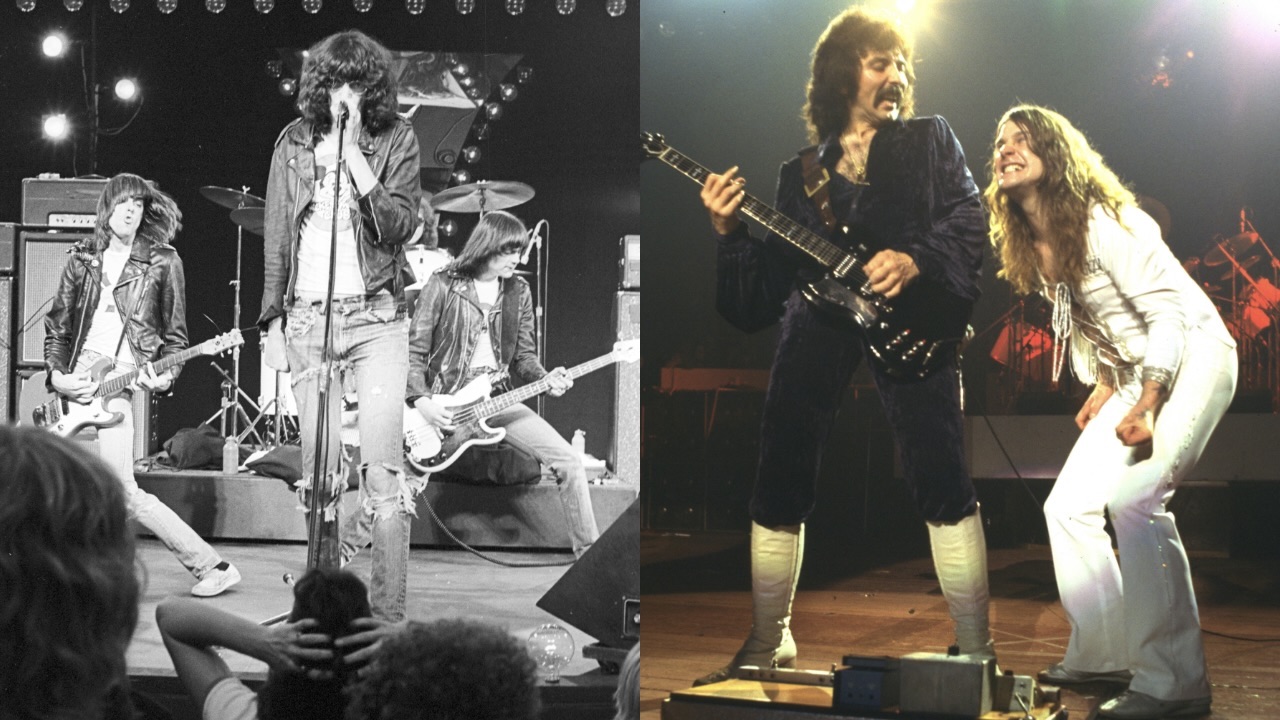When Rolling Stone magazine went on the road in America with the Ramones in the autumn of 1978, it found the Forest Hills, New York quartet tiring of both their own cult status and the punk scene's nihilistic, self-destructive reputation.
"I‘m sick of not selling records," vocalist Joey Ramone bluntly admitted to writer Timothy White. "I want to draw more people to the shows, make something happen. If the new album isn’t a hit, I’m gonna kill myself."
At the time, the estimated worldwide sales for Road To Ruin, the quartet's fourth studio album, were nudging north of 250,000 units sold. However, it had failed to break into the business end of the Billboard 200 chart, peaking at number 103. To make matters worse, in the eyes of the American music industry, following the Sex Pistols' disastrous debut US tour, punk rock was now viewed as tainted and toxic.
That impression only intensified when, on October 12, 1978, Nancy Spungen, the 20-year-old girlfriend of Pistols' bassist Sid Vicious, was found with a fatal stab wound in the couple's room at New York's Hotel Chelsea: the English musician was subsequently arrested and charged with second-degree murder. When news of the indictment spread, venues across the country began cancelling scheduled punk shows and radio stations pulled punk singles from their playlists. As known friends of the Pistols, the Ramones were damned by association.
"It had nothing to do with us," Johnny Ramone protested to Rolling Stone. "We don’t look or act like them. We weren’t out to ruin the music business. There’s room for everybody. When we started we were more or less looking at the hard-rock groups of America like Aerosmith and Ted Nugent and Kiss as our competition."
Under the circumstances then, there was a cold, hard business logic behind the group's new booking agency, Premier Talent, targeting slots for the Queens quartet on bills headlined by mainstream hard rock and metal bands: "Our new booking agent thought it would expand our audience," Joey Ramone explained, as the group's name was added to national gig listings as the opening act on winter 1978 arena and auditorium shows with Foreigner, Eddie Money, Rick Derringer and Black Sabbath.
The bruddahs' first date with Sabbath, at Atlanta's Omni Coliseum on November 13, was hard work, not least because the audience were impatient to see the country's hottest new hard rock act, Van Halen, in the night's 'special guests' slot, pre-Sabbath. But the hostility the Ramones faced in Georgia was as nothing compared to what lay ahead.
In 1982, photographer Marty Perez snapped a now-iconic image of a Black Sabbath fan in the front row of a Seattle, Washington gig holding up a hand-printed T-shirt bearing the slogan 'Kill A Punk For Rock & Roll.' Sabbath fans in California must have got the memo a full four years early.
That local heroes Van Halen pulled out of Sabbath's Never Say Die! tour ahead of the Californian dates probably didn't help the mood of metal fans attending the British group's December 1 show at the Swing Auditorium in San Bernardino. Nor did the fact that the show's promoter advertised the gig as a face-off between punk rock and heavy metal. "The metal fans were by far the majority of the crowd, so they came ready to kill," recalled Ramones' lighting director/graphic designer/'Fifth Ramone' Arturo Vega in Classic Rock writer Everett True's 2002 Ramones biography Hey Ho Lets Go! The Story of the Ramones. "And they tried, aiming at the band with cans full of beer. After six songs, the amps and stage will all covered with garbage. That was scary... but it got worse."
To be fair, the set's opening numbers - Rockaway Beach, Teenage Lobotomy, Blitzkrieg Bop - were met with applause and cheers. But as Rock N' Roll High School, song seven on the setlist, ground to a halt, boos and shouts of 'Sabbath!' practically drowned out Joey Ramone's introduction to Don't Come Close. Within five minutes, all hell broke lose as the band were pelted with anything the audience could lay their hands on.
"It was when we started playing Surfin' Bird," Joey told Everett True, "and everything in the world came on. It started raining carburrettors and whiskey bottles. The stage manager was about 65 and he told us that he hadn't seen anything like it since the Stones first played America."
It was when an ice pick landed at Johnny Ramone's feet that the group decided to beat a hasty retreat for their own safety.
"No one got hurt," Joey recalled, "but we said fuck you and got off the stage."
In a final act of defiance, Dee Dee Ramone walked to the front of the stage with his bass above his head and told the baying crowd, "Fuck you, we're the future."
“Playing with Sabbath was dangerous," tour manager Monte Melnick concluded.
That the Ramones' final tour saw them sharing the main stage at Lollapalooza 1996 with Rancid, Screaming Trees, Soundgarden and headliners Metallica was evidence that tensions between punks and metalheads had long been consigned to the past. But for 20 minutes back in 1978, that scene unity was in dangerously short supply.
Listen to the Ramones' aborted set below:

